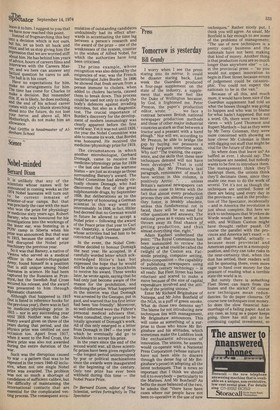Science )9
Nobel-minded
Bernard Dixon
It is unlikely that any of the scientists whose names will be announced in coming weeks as the 1974 Nobel laureates will turn out to be current inmates of Prlsoner-of-war camps. But that Was precisely the case with the man Who won the prize for physiology ar medicine sixty years ago. Robert Parany, who was honoured for his Investigations into the workings of the inner ear, was festering in a
W camp in Siberia when his Prize was announced. But that was in 1915, because the onset of war had disrupted the Nobel prize Machinery the previous year. So it was that Barany, a native of Vienna who served as a medical officer in the Austro-Hungarian Army, found himself in a position that is still unique among Nobel laureates in science. He had been captured by the Russians at PrzeInYsi,:.but the Swedish Rex! Cross secured his release, and the award Was presented to him through diplomatic channels.
Although that happened in 1915 (but is listed in reference books for the previous year), there was in fact no medicine/physiology prize in 1915 — nor in any succeeding year until 1919. Neither was the chemistry award given on three of the Years during that period, and the Physics prize was omitted on one occasion too. Apart from 1917, When it went to the Red Cross, the Peace prize was also not awarded during the entire duration of the War.
Such was the disruption caused by war — a pattern that was to be repeated in the years 1940-42 inclusive, when not one single Nobel Prize was awarded. The problem was not so much a shortage of candidates of sufficient calibre, but the difficulty of maintaining the International contacts that are essential for the complicated vetting process. The consequent accu
mutation of outstanding candidates undoubtedly had its effect afterwards in accentuating the time lag between a person's research and the award of the prize — one of the weaknesses of the system, counter to the wishes of Alfred Nobel, for which the authorities have long been criticised.
The prime example, whose recognition was also delayed by the exigencies of war, was the French bacteriologist Jules Bordet. In 1896 he showed that fresh serum from a person immune to cholera, when added to cholera bacteria, caused them to break down. This process could be used not only to study the body's defences against invading microbes, but also as a diagnostic test. The crucial importance of Bordet's discovery for the development of modern immunology was clearly apparent before the first world war. Yet it was not until 1920, the year the Nobel Committee was able to resume its work, that Bordet was honoured. He received the medicine/physiology prize for 1919.
The circumstances in which another microbiologist, Gerhard Domagk, came to receive the medicine/physiology prize for 1939 — the last one before the wartime hiatus — are just as strange as those surrounding Barany's award. The Nobel Committee had already virtually chosen Domagk, who had discovered the first of the great sulphonamide drugs, by September 1938. But deliberations as to the proprietary of honouring a German scientist in this way went on interminably. In 1936, in fact, Hitler had decreed that no German would in future be allowed to accept a Nobel prize — following the award of the Peace prize that year to Carl von Ossietzky, a German pacifist whose activities had led him to be convicted of high treason.
In the event, the Nobel Committee decided to honour Domagk the next year. He accepted, in d carefully worded letter which acknowledged Hitler's ban but expressed the hope that he would still be able to appear in Stockholm to receive his award. Three weeks later, he wrote again, saying that he had only just become aware of the reason for the prohibition, and declining the prize. What happened in the interim was that Domagk was arrested by the Gestapo, put in gaol, and warned that his first letter had been 'too friendly'. Moreover, so well-informed were the Fithrer's personal medical advisers that, when consulted, they proved to be totally ignorant of Domagk's work. All of this only emerged in a letter from Domagk in 1947 — the year in which he eventually did go to Stockholm to accept his prize.
In the years since the end of the second world war, all three scientific prizes have been given regularly —the longest period uninterrupted by war or political machinations since the awards were inaugurated at the beginning of the century. Only 'one prize has ever been withheld during this time — the Nobel Peace Prize.
Dr Bernard Dixon, editor of New Scientist, writes fortnightly in The Spectator


































































 Previous page
Previous page